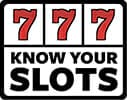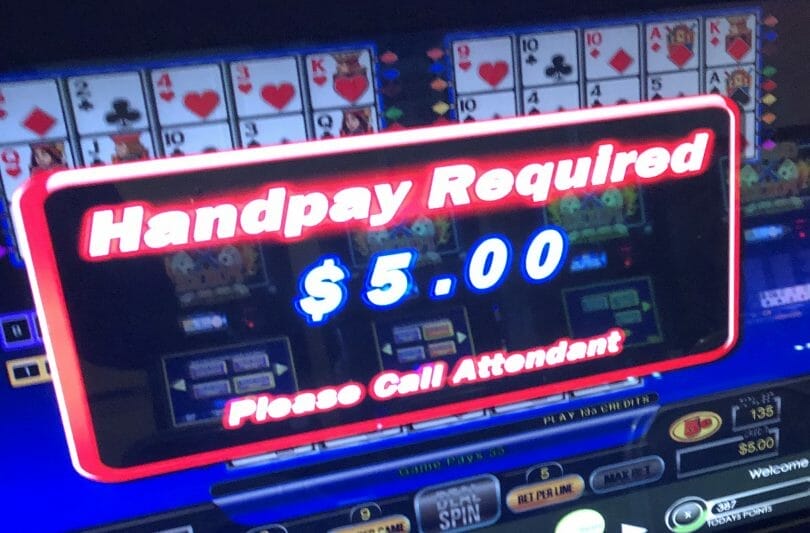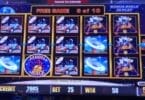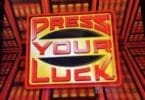Slot machines, video poker, and other casino games effectively run on computers are complicated, sophisticated system that run on very technical software. To end users like us, who play the games, the experience 99 percent of the time tends to be smooth.
Occasionally, we trip across unusual issues. A bank of Mighty Cash Double Up games at one of my locals was having trouble loading and rendering background images. I watched a player next to me have her slot machine crash mid bonus. It took about 10 minutes for the game to reboot, but it picked right back up where her bonus left off.
I’ve had other random things happen to me, like the $5 handpay shown at the top. The slot attendant felt so bad for me he handed me a $5 bill and said I didn’t have to wait around. Friends of mine and I love trading bizarre handpay pictures like that back and forth.
But for the most part, it’s harmless. These are computer programs, built, designed and programmed by humans, and issues will happen. Slot manufacturers have the standard expected complement of QA, internal testers, and even market tests for games where they’re trying to figure out if they’ve gotten the math and/or design right for a game that players will like or not.
Slot companies build in safeguards to protect if things go wrong, forcing reboots to bring the game back to life, and other standard computer-related maneuvers to get the game into good service.
But sometimes, things go wrong at a deeper level. The machine says malfunctions voids all wagers and pays, but what happens when the game itself is simply flawed? Usually, the game gets updated by the slot manufacturer, and if it’s not a huge deal it’s just done in the regular cycle.
Sometimes, it requires a bigger step. Take Invaders Attack from the Planet Moolah, the latest iteration of the Planet Moolah series that has been part of the WMS line for well over a decade. The game started rolling out in California, and a weird thing started to emerge.
A lot of slot channels were showing videos with the Unicow being captured. This is supposed to be a rare event, but it was happening with what appeared to be unusual frequency.
The game was ultimately pulled from all the casinos for a period of time, and eventually rolled back out, and lo and behold there weren’t the same wave of Unicows being captured as before. In all likelihood, whatever issue existed was either fixed and resolved, or perhaps a fresh round of tests was conducted just in case it was a bit of a fluke, and the game returned to casino floors playing as expected.
While the manufacturer will nearly never come out and say it publicly when an issue is discovered, they, along with casinos, watch the payback of machines and how they’re skewing compared to the expected payout. If a new game is skewing too far from the expected norm that isn’t likely mathematically, the game will be pulled and reviewed, the issues fixed if found, the games patched, and the rollout resumed.
As such, this is why in some instances games will roll out slow and steady, vs. popping up in a ton of casinos all at once. You’ll see a game make its debut at a single casino, and then slowly pop up over a few weeks at more casinos until the data bears out that all is well, and the rollout can expand more quickly from there.
This is also why sometimes multiple games will be available for a new cabinet at once – it gives casinos and manufacturers a fallback to load up if this happens. In the case of Moolah, casinos could plug in the latest Jackpot Party, which was already released on the same cabinet and available to be activated in place of Moolah, while the game was reviewed.
As far as Advantage Players, if they’re able to catch on to something being amiss while a game is still available and open on the casino floor, they could theoretically take advantage. The game is being offered by the casino and slot manufacturer, so the player is not doing anything wrong, nor manipulating the game.
Of course, once a game is discovered to be flawed, it’ll be taken offline and fixed. And a sudden jump in interest of a game that has an issue may just bring attention to it more quickly as the data proves there’s something going on.
In the end, casino games have the potential to be buggy like any other coded computer software. Much of the time, it has no impact on manufacturer or casino, so there’s no harm other than the frustration of an issue, and over time many of these issues can be patched through software updates or hardened versions of system software as the machines and games evolve.
But occasionally, it can slip into the game itself, where the consequences are higher, and leads to a more aggressive action, such as pulling a game temporarily to review and/or resolve issues.








